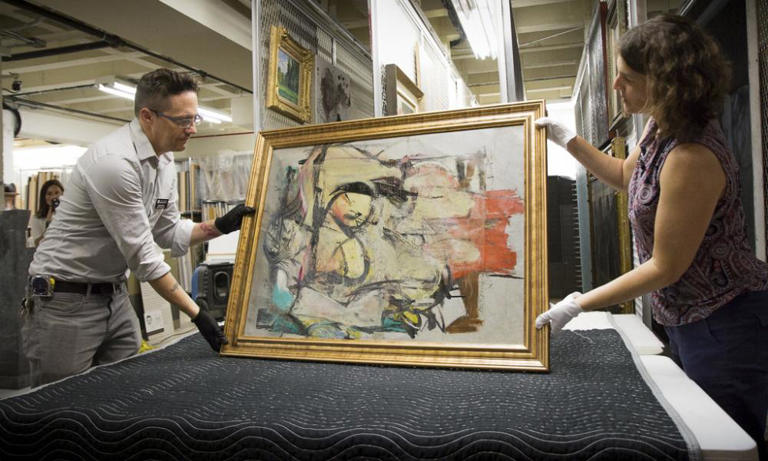Florida
Iguana Found Stuck in Florida's Resort Water Slide Alongside 30 Eggs in 'Unusual' Removal Job
:max_bytes(150000):strip_icc():focal(748x424:750x426)/iguana-stuck-in-pool-tout-042424-eed2cd4decfd4609a51c1d26a961b89b.jpg)
A female iguana is free again after an “unusual” encounter with a water slide.
On April 19, Humane Iguana Control, an iguana removal company in southern Florida, received a call about a female iguana found inside a pool slide jet at a Miami-Dade resort. The resort also found numerous iguana eggs at the bottom of the pool connected to the slide.
“When we got the call, we dropped everything we were doing and rushed to the location,” Michael Ronquillo from Humane Iguana Control told WFLA. Humane Iguana Control also shared photos and videos from the incident on Facebook, noting that the slide situation was “a first for us.”
“This was one of the most unusual iguana removal jobs we have come across,” Humane Iguana Control shared in a statement obtained by PEOPLE.
Courtesy of Humane Iguana Control
“Upon arrival, the iguana managed to find its way out of the jet, and we were able to remove the iguana eggs swiftly. We’re not sure how the iguana eggs ended up in that pool! During this time of year, which is breeding season, female iguanas will lay their eggs in burrows, but at times, they will randomly lay their eggs in strange places,” the company added.
On social media, Humane Iguana Control shared photos of the iguana eggs its employees found scattered underwater at the bottom of the pool and a shot of the iguana trapped inside the pool slide.
In its Facebook video, Humane Iguana Control noted that employees checked the pool’s pipes with an endoscopy camera “to make sure” all creatures were cleared from the area before gathering the eggs.
Humane Iguana Control collected around 30 iguana eggs from the pool. Ronquillo told WSVN that it is unclear how the eggs ended up in the pool while the iguana was in the slide, but he shared a theory.
“Our guess is [the iguana laid] them around the slide area, and the eggs just rolled down from the slide, so that’s pretty much how they ended up in that area,” he said.
In its statement to PEOPLE, Humane Iguana Control noted the iguanas, an invasive species in Florida, are a common problem in South Florida, “just like roaches would be throughout the USA.”
Courtesy of Humane Iguana Control
“You will most likely come across an iguana in or around your property, and no property is safe from this invasive species,” Humane Iguana Control shared about the situation in South Florida.
Never miss a story — sign up for PEOPLE’s free daily newsletter to stay up-to-date on the best of what PEOPLE has to offer, from celebrity news to compelling human interest stories.
Humane Iguana Control also recommended that Florida residents do not try to remove iguanas from their homes alone.
“If you do not have experience handling these reptiles, you may get injured due to their sharp nails and teeth; also, their tails can whip at speeds of 30 mph! If you come across an iguana burrow, you should not cover it until it is inspected for iguanas and their eggs,” the company advised.
To learn more about iguanas and how to handle encounters with these reptiles, visit Humane Iguana Control’s website.

Florida
Florida Saw Jump in Workers' Comp Cost per Claim in 2022-23, WCRI Report Shows

Call it the effects of wage creep during the pandemic, along with a little bit of creep in the duration of benefits.
Employers and insurers in Florida saw a 7% increase in total cost per workers’ compensation claim in 2022 and 2023, to just over $30,000 on average, due largely to higher wages and longer temporary disability benefits duration. That was the finding of an analysis by the Workers Compensation Research Institute, which compared COVID-19 pandemic-era costs in Florida and 16 other states.
“The large indemnity growth in 2022 was mainly driven by increases in the average preinjury weekly wage of workers with injuries and duration of temporary disability. In particular, wages in Florida grew 9.5 percent in 2022, faster than the increases in prior years,” notes the report, authored by WCRI researcher Rebecca Yang. Other study states saw similar cost increases.
The work echoed other studies that have found that as employers rebounded from the pandemic shutdowns, they were forced to pay higher wages to attract workers. That led to higher payrolls and higher weekly benefits for injured employees.
The trend was highlighted late last year when the Florida Division of Workers’ Compensation raised the 2024 maximum weekly indemnity benefit to reflect the big jump in average weekly wages. The average wage rose from $1,099 in 2021 to $1,260 in 2023 – a 15% increase. That much of an increase had not been since the high-inflation days of 1980, which saw a 20% spike in wages from two years earlier.
The reasons for a half-week increase in temporary disability benefits duration were also related to the economic realities of the pandemic. In many states, including Florida, TD duration increased in 2020, declined or remained stable in 2021, then increased again in 2022. High unemployment early in the COVID era may have kept some injured workers out of a job, leading to longer injury or benefits duration times, the WCRI report said.
Later, as employment rose nationwide, “the tight labor markets and the potential workforce shortages associated with this reality may have led to longer working hours and worse overall health among current employees.”
The study underscored what other analyses have found – that many employers were forced to hire less-experienced workers in 2022, which may have led to higher injury rates in some job classifications. Post-pandemic, employers have seen an increase in comorbidities for workers. Some employees may have had problems accessing medical care due to a shortage of health care professionals, the study said.
“These factors may have led to more severe injuries, prolonged recovery, and slower return to work,” the report noted.
The analysis found that duration of temporary disability in Florida increased in 2022 in most industry groups and across age groups with workers aged 35 and above at the time of injury. The report can be accessed here.
It’s too soon to know if the higher costs will put pressure on workers’ compensation rates in Florida. The state, like most others, has seen a steady drop in comp rates over the last two decades. Late last year, Florida regulators approved a 15% average decrease in rates.
WCRI also found that medical payments per claim have remained stable in recent years, in contrast to a 5% per-year increase in the years from 2017 to 2019. Part of the stability was due to a drop in the utilization of medical services at ambulatory surgery centers and other non-hospital providers, the report noted.
That cost stability could be positively impacted, at least to some degree, by new Florida limits on emergency room costs. Florida Gov. last week signed House Bill 989, which, among other changes, clarifies that emergency care, except those procedures subject to the maximum reimbursement allowance, must be set at 250% of Medicare’s rates, unless governed by a contract.
The “agency bill,” which addresses a wide range of issues identified by the Florida Department of Financial Services, also requires DFS to work with actuarial firms to develop maximum reimbursement allowances for emergency services.
Topics
Florida
Trends
Workers’ Compensation
Interested in Trends?
Get automatic alerts for this topic.
Florida
Marco Rubio refuses to say whether he’d leave Florida if Trump picks him as VP

Florida Senator Marco Rubio, the man Donald Trump once dubbed “Little Marco,” is now vying to be his 2024 vice presidential pick.
And due to a ”technical glitch” in the Constitution, it may be difficult for both the VP and president to be from the same state, which means Mr Rubio may have to leave Florida.
On Fox News Sunday, host Shannon Bream asked whether the Florida Senator would leave the state of Florida or change his residency if he were asked to join Mr Trump’s 2024 ticket.
In short, the Republican lawmaker didn’t answer her question.
He did, however, say, that Mr Trump is “going to have an extremely talented group of people that can serve this country in multiple roles, and that’s a decision he’s going to have to make.”
He added, “Leaving me aside for a moment, I think that before anyone decides to move from their state, you better make sure you don’t move to a state where there’s not some DA [district attorney] that makes a career after going after Republicans.”
Senator Rubio seemed to be referring to the ongoing hush money trial in New York that was brought by the Manhattan DA’s office. Mr Trump is now standing criminal trial, with 34 counts of falsifying business records related to payments given to adult film star Stormy Daniels before the 2016 election in exchange for her silence about an alleged affair with Mr Trump.
Bream then joked, “So, if you do move, not to New York. That won’t be your choice.”
The Fox News host then said there could be a “technical glitch with having two people from the same state when it comes down to an Electoral College vote,” should Mr Rubio be named as Mr Trump’s running mate.
She was referring to the 12th Amendment, which states that after a presidential election, “the Electors shall meet in their respective states and vote by ballot for President and Vice-President, one of whom, at least, shall not be an inhabitant of the same state with themselves.”
This could become a problem when Florida electors cast their votes, should a Trump-Rubio ticket emerge, since both men are from the same state as those electors.
But the former president has yet to unveil his 2024 running mate.
Mr Rubio has been considered to be on the former president’s shortlist of potential running mates, and was one of a handful of possible veep contenders at Mar-a-Lago this weekend for a RNC donor retreat.
The evolution of Mr Trump and Mr Rubio’s relationship from infamous feuds to potential running mates is astounding.
Both men ran for the 2016 GOP nominee, and their online spats quickly devolved into name-calling and jokes about the other’s physical appearance. Most notably, Mr Trump labeled the Florida Senator “Little Marco” while Mr Rubio suggested that Mr Trump had “small hands.”
Florida
University of Florida president on response to protests: ‘You don’t get to take over the whole university’

University of Florida President Ben Sasse responded to the ongoing pro-Palestinian protests breaking out on his college campus and others across the country, saying that while students have a right to peacefully protest, they cannot “take over the whole university.”
“And what we tell all of our students, protesters and non, is there are two things we’re going to affirm over and over again, we will always defend your right to free speech and free assembly,” Sasse said on CNN’s “State of the Union.”
“And also, we have time, place, and manner restrictions, and you don’t get to take over the whole university. People don’t get to spit at cops. You don’t get to barricade yourselves in buildings. You don’t get to disrupt somebody else’s commencement,” he said.
Sasse, a former senator representing Nebraska, reiterated that neither protesters nor other students have the right to set up encampments on campus.
“I ran by our group of protesters waving their Palestinian flag; we protect their right to do that. But we have rules. And one of those rules is we don’t allow camping on campus. And so, you can’t start to build an encampment, but our goal is not to arrest people,” he said.
“It’s to help them get into compliance with the rules. They can protest. They can try to persuade people, but they don’t get a build a camp. Nobody, nobody else does either,” he added.
The pro-Palestinian protests have been breaking out across the country for weeks, resulting in arrests, the cancellation of commencement ceremonies and moving in-person classes to online. The demonstrations have garnered national attention as protesters have set up encampments on campuses throughout the nation.
Sasse noted that officials are not going to “negotiate with people who scream the loudest” amid protests that have occurred on the University of Florida’s campus. He also added that the commencement ceremonies on his campus have not been disrupted.
“We believe in the right to free speech. We believe in the right to free assembly, and you can try to persuade people,” he said. “But what you see happening on so many campuses across the country is instead of drawing the line in speech and action, a lot of universities bizarrely give the most attention and most voice to the smallest, angriest group, and it’s just not what we’re going to do here.”
Copyright 2024 Nexstar Media Inc. All rights reserved. This material may not be published, broadcast, rewritten, or redistributed.
-

 Politics1 week ago
Politics1 week agoColumbia University’s policy-making senate votes for resolution calling to investigate school’s leadership
-

 News1 week ago
News1 week agoBoth sides prepare as Florida's six-week abortion ban is set to take effect Wednesday
-

 World1 week ago
World1 week agoBrussels, my love? MEPs check out of Strasbourg after 5 eventful years
-

 Politics1 week ago
Politics1 week agoHouse Republicans brace for spring legislative sprint with one less GOP vote
-

 Movie Reviews1 week ago
Movie Reviews1 week agoThis Never Happened (2024) – Review | Tubi Horror Movie | Heaven of Horror
-

 World1 week ago
World1 week agoAt least four dead in US after dozens of tornadoes rip through Oklahoma
-

 News1 week ago
News1 week agoPro-Palestinian campus protesters face looming deadlines and risk of arrest
-

 Politics1 week ago
Politics1 week agoGOP Rep. Bill Posey won't seek re-election, endorses former Florida Senate President as replacement














